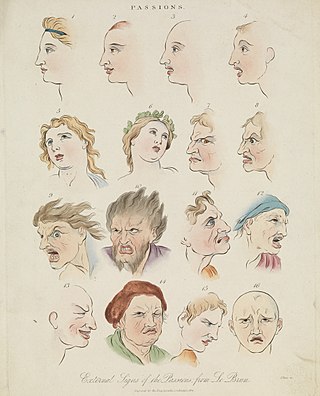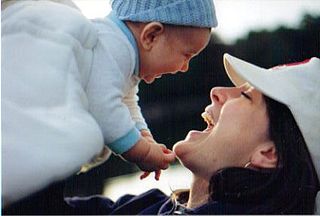
Emotions are physical and mental states brought on by neurophysiological changes, variously associated with thoughts, feelings, behavioral responses, and a degree of pleasure or displeasure. There is no scientific consensus on a definition. Emotions are often intertwined with mood, temperament, personality, disposition, or creativity.

Anger, also known as wrath or rage, is an intense emotional state involving a strong, uncomfortable and non-cooperative response to a perceived provocation, hurt, or threat.
Appeal to emotion or argumentum ad passiones is an informal fallacy characterized by the manipulation of the recipient's emotions in order to win an argument, especially in the absence of factual evidence. This kind of appeal to emotion is irrelevant to or distracting from the facts of the argument and encompasses several logical fallacies, including appeal to consequences, appeal to fear, appeal to flattery, appeal to pity, appeal to ridicule, appeal to spite, and wishful thinking.

An attitude "is a summary evaluation of an object of thought. An attitude object can be anything a person discriminates or holds in mind." Attitudes include beliefs (cognition), emotional responses (affect) and behavioral tendencies. In the classical definition an attitude is persistent, while in more contemporary conceptualizations, attitudes may vary depending upon situations, context, or moods.

In colloquial usage, contempt usually refers to either the act of despising, or having a general lack of respect for something. This set of emotions generally produces maladaptive behaviour. Other authors define contempt as a negative emotion rather than the constellation of mentality and feelings that produce an attitude. Paul Ekman categorises contempt as the seventh basic emotion, along with anger, disgust, fear, happiness, sadness and surprise. Robert C. Solomon places contempt on the same emotional continuum as resentment and anger, and he argues that the differences between the three are that resentment is anger directed towards a higher-status individual; anger is directed towards an equal-status individual; and contempt is anger directed towards a lower-status individual.
An emotional expression is a behavior that communicates an emotional state or attitude. It can be verbal or nonverbal, and can occur with or without self-awareness. Emotional expressions include facial movements like smiling or scowling, simple behaviors like crying, laughing, or saying "thank you," and more complex behaviors like writing a letter or giving a gift. Individuals have some conscious control of their emotional expressions; however, they need not have conscious awareness of their emotional or affective state in order to express emotion.

Affect, in psychology, is the underlying experience of feeling, emotion, attachment, or mood. It encompasses a wide range of emotional states and can be positive or negative. Affect is a fundamental aspect of human experience and plays a central role in many psychological theories and studies. It can be understood as a combination of three components: emotion, mood, and affectivity. In psychology, the term affect is often used interchangeably with several related terms and concepts, though each term may have slightly different nuances. These terms encompass: emotion, feeling, mood, emotional state, sentiment, affective state, emotional response, affective reactivity, disposition. Researchers and psychologists may employ specific terms based on their focus and the context of their work.
An emotional bias is a distortion in cognition and decision making due to emotional factors.
The Independent Book Publishers Association (IBPA) is a not-for-profit membership organization serving the independent publishing community through advocacy and education. With over 3,500 members, IBPA is the largest publishing trade association in the United States. IBPA programs and publications include the IBPA Book Award/Benjamin Franklin Award, IBPA Publishing University, and the monthly Independent Magazine. IBPA was founded in 1983 as the Publishers Association of Southern California (PASCAL). It later became the Publishers Marketing Association (PMA). It adopted its present name in 2008.
Discrete emotion theory is the claim that there is a small number of core emotions. For example, Silvan Tomkins concluded that there are nine basic affects which correspond with what we come to know as emotions: interest, enjoyment, surprise, distress, fear, anger, shame, dissmell and disgust. More recently, Carroll Izard at the University of Delaware factor analytically delineated 12 discrete emotions labeled: Interest, Joy, Surprise, Sadness, Anger, Disgust, Contempt, Self-Hostility, Fear, Shame, Shyness, and Guilt.

Emotion classification, the means by which one may distinguish or contrast one emotion from another, is a contested issue in emotion research and in affective science. Researchers have approached the classification of emotions from one of two fundamental viewpoints:
- that emotions are discrete and fundamentally different constructs
- that emotions can be characterized on a dimensional basis in groupings
Display rules are a social group or culture's informal norms that distinguish how one should express oneself. They function as a way to maintain the social order of a given culture, creating an expected standard of behaviour to guide people in their interactions. Display rules can help to decrease situational ambiguity, help individuals to be accepted by their social groups, and can help groups to increase their group efficacy. They can be described as culturally prescribed rules that people learn early on in their lives by interactions and socializations with other people. Members of a social group learn these cultural standards at a young age which determine when one would express certain emotions, where and to what extent.

Jaak Panksepp was an Estonian-American neuroscientist and psychobiologist who coined the term "affective neuroscience", the name for the field that studies the neural mechanisms of emotion. He was the Baily Endowed Chair of Animal Well-Being Science for the Department of Veterinary and Comparative Anatomy, Pharmacology, and Physiology at Washington State University's College of Veterinary Medicine, and Emeritus Professor of the Department of Psychology at Bowling Green State University. He was known in the popular press for his research on laughter in non-human animals.
Affect measures are used in the study of human affect, and refer to measures obtained from self-report studies asking participants to quantify their current feelings or average feelings over a longer period of time. Even though some affect measures contain variations that allow assessment of basic predispositions to experience a certain emotion, tests for such stable traits are usually considered to be personality tests.

Sorrow is an emotion, feeling, or sentiment. Sorrow is more 'intense' than sadness, implies a long-term state and suggests — unlike unhappiness — a degree of resignation.

In humans, posture can provide a significant amount of important information through nonverbal communication. Psychological studies have also demonstrated the effects of body posture on emotions. This research can be traced back to Charles Darwin's studies of emotion and movement in humans and animals. Currently, many studies have shown that certain patterns of body movements are indicative of specific emotions. Researchers studied sign language and found that even non-sign language users can determine emotions from only hand movements. Another example is the fact that anger is characterized by forward whole body movement. The theories that guide research in this field are the self-validation or perception theory and the embodied emotion theory.

Research into music and emotion seeks to understand the psychological relationship between human affect and music. The field, a branch of music psychology, covers numerous areas of study, including the nature of emotional reactions to music, how characteristics of the listener may determine which emotions are felt, and which components of a musical composition or performance may elicit certain reactions.
Jude Bijou is a licensed psychotherapist, lecturer, and multi-award winning author of Attitude Reconstruction: A Blueprint for Building a Better Life. Her approach to understanding and integrating human behavior is based on 33 years of private practice therapy with individuals and couples. Jude Bijou is the daughter of pioneer behavioral child psychologist, Sidney W. Bijou, holds a Bachelor of Arts degree from Reed College, as well as a Master’s in psychology from Carleton University.
Emotional climate is a concept that quantifies the “climate” of a community, being a small group, a classroom, an organization, or a geographical region. It refers to the emotional relationships among members of a community and describes the overall emotional environment within a specific context.
A functional account of emotions posits that emotions facilitate adaptive responses to environmental challenges. In other words, emotions are systems that respond to environmental input, such as a social or physical challenge, and produce adaptive output, such as a particular behavior. Under such accounts, emotions can manifest in maladaptive feelings and behaviors, but they are largely beneficial insofar as they inform and prepare individuals to respond to environmental challenges, and play a crucial role in structuring social interactions and relationships.








